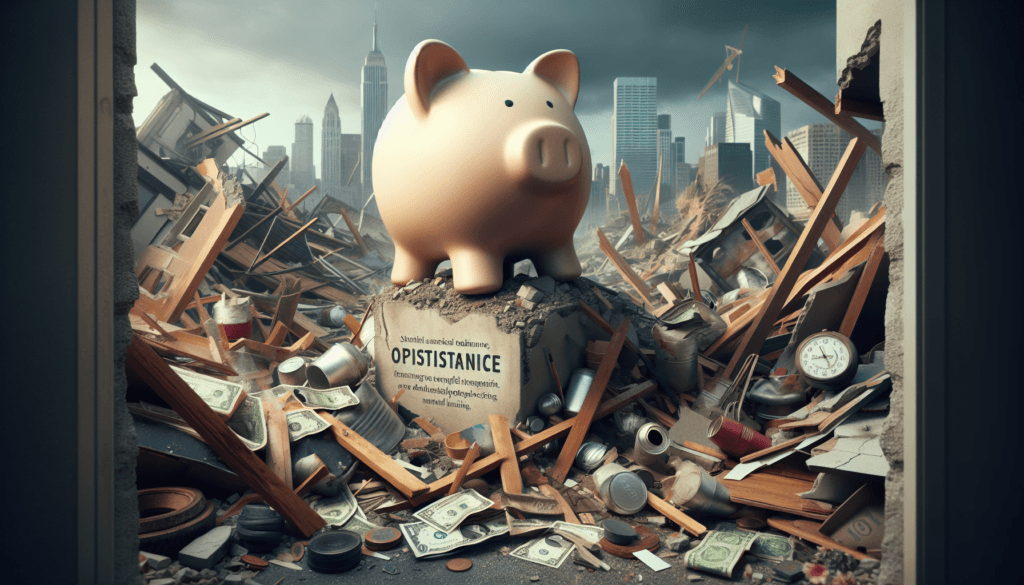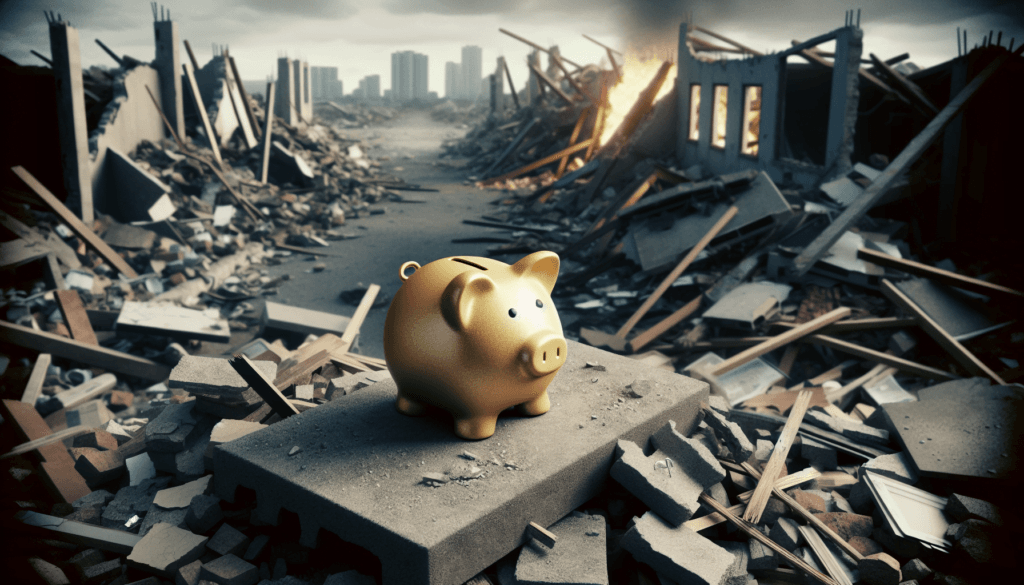In today’s unpredictable world, it is essential to be prepared for any unexpected event, particularly the aftermath of a Disaster. While the focus is often on physical safety and damage control, it is equally important to consider the financial implications that may arise in such situations. This article provides valuable insights and practical advice on how to financially prepare for the aftermath of a disaster, ensuring that you are equipped to navigate the challenging times ahead and secure your financial well-being.
Table of Contents
How To Financially Prepare For The Aftermath Of A Disaster
Assessing Your Financial Situation
Evaluate your current financial status
Before you can effectively prepare for the aftermath of a disaster, it is crucial to assess your current financial situation. Take the time to review your income, expenses, and any existing debt. Understanding your financial standing will provide a clear picture of where you stand and enable you to make informed decisions moving forward.
Determine potential disaster-related expenses
It is essential to determine the potential expenses that may arise in the aftermath of a disaster. Consider the costs of temporary housing, repairs or rebuilding, medical expenses, and any other unforeseen financial burdens. By identifying these potential expenses, you can better plan and allocate resources to handle them effectively.
Creating an Emergency Fund
Understand the importance of an emergency fund
An emergency fund is a financial safety net that can provide a sense of security during challenging times, including the aftermath of a disaster. It is critical to understand the importance of having an emergency fund to cover unexpected expenses and maintain financial stability. This fund should be easily accessible and separate from your regular savings to ensure quick access to funds when needed.
Calculate how much to save for emergencies
Determining how much to save for emergencies can be a daunting task, but it is a crucial part of financial preparedness. Experts generally recommend having three to six months’ worth of living expenses in your emergency fund. Consider expenses such as rent or mortgage payments, utilities, groceries, and healthcare costs when calculating the necessary amount. Keep in mind that the specific amount may vary based on individual circumstances.
Establish a dedicated savings account
To ensure the accessibility and separation of your emergency fund, it is advisable to open a dedicated savings account. A separate account allows you to track your emergency fund’s growth and prevents accidental spending on other expenses. Research different savings account options and choose one that offers competitive interest rates and favorable terms to maximize your savings.

Insurance Coverage
Review your existing insurance policies
Reviewing your existing insurance policies is crucial to understand the extent of coverage for disaster-related expenses. Evaluate your homeowner’s insurance, renter’s insurance, health insurance, and any other relevant policies. Pay close attention to coverage limits, exclusions, and deductibles. Understanding the details of your policies will allow you to identify any gaps in coverage and make informed decisions regarding additional insurance needs.
Consider additional disaster-related coverage
Depending on your location and specific circumstances, additional insurance coverage may be necessary to protect against disaster-related expenses. Evaluate the need for flood insurance, earthquake insurance, or any other specialized coverage based on the risks prevalent in your area. Consult with an insurance professional to determine the appropriate coverage based on your individual needs.
Understand policy details and exclusions
While it is essential to have insurance coverage, it is equally important to understand the fine print of your policies. Read through your insurance policies carefully to familiarize yourself with the policy details and exclusions. Understanding what is covered and what is not will prevent unpleasant surprises when filing a claim. If you have any questions or concerns, reach out to your insurance provider for clarification.
Organizing Important Documents
Gather and secure important documents
Organizing your important documents is a necessary step in ensuring financial preparedness. Gather documents such as identification cards, passports, birth certificates, insurance policies, wills, and property deeds. Keep them in a secure location and consider using a waterproof and fire-resistant safe or a safety deposit box in a bank. Having these documents readily available will expedite any necessary paperwork after a disaster.
Create digital backups of crucial paperwork
In addition to physical copies, it is vital to create digital backups of your crucial paperwork. Scan and save electronic copies of your important documents to a secure location, such as an encrypted cloud storage service or a password-protected external hard drive. Storing digital copies alongside physical copies provides an extra layer of protection, ensuring that your documents are not lost or damaged in the event of a disaster.

Budgeting and Cash Flow Planning
Track your income and expenses
To effectively manage your personal finances, it is crucial to track your income and expenses regularly. Keep a record of your sources of income and all your expenditures. By understanding your cash flow, you can identify areas where you may be overspending and pinpoint areas where you can make adjustments to save more money.
Identify areas for potential cost-cutting
Review your expenses and identify areas where you can potentially cut costs. This may include reducing discretionary spending, negotiating utility bills, or exploring alternative options for services such as cable or internet. Small adjustments in your everyday expenses can add up and provide extra funds that can be allocated towards your emergency fund or insurance payments.
Develop a realistic budget
Based on your income, expenses, and financial goals, develop a realistic budget that ensures you are living within your means. Assign funds to different categories, such as groceries, utilities, transportation, and savings, while accounting for non-monthly expenses such as quarterly bills or annual subscriptions. Regularly review and adjust your budget as needed to reflect changing circumstances or goals.
Debt Management and Credit
Assess your current debt situation
Evaluating your current debt situation is an essential part of financial preparedness. Make a list of all your outstanding debts, including credit card debt, student loans, and personal loans. Take note of the interest rates, minimum monthly payments, and repayment terms for each debt. Understanding the magnitude of your debt and its impact on your overall financial health will help you make informed decisions going forward.
Explore debt consolidation options
Consider exploring debt consolidation options if you have multiple debts with high-interest rates. Debt consolidation involves combining multiple debts into one loan with a lower interest rate, making it easier to manage and pay off. Research different consolidation methods, such as balance transfers, personal loans, or debt management plans, to determine the best approach based on your circumstances.
Monitor your credit report
Regularly monitor your credit report to ensure its accuracy and detect any suspicious activity. You are entitled to a free credit report from each of the three major credit bureaus – Equifax, Experian, and TransUnion – once a year. Review your credit report for any errors, unauthorized accounts, or signs of identity theft. Promptly report any discrepancies to the credit bureaus to protect yourself from potential financial issues.

Income Protection
Evaluate your job stability and income sources
Assessing your job stability and income sources is crucial for financial preparedness. Evaluate the stability of your current employment and consider any potential risks or vulnerabilities. Additionally, explore alternative income sources, such as freelance work or part-time jobs, which can provide additional financial stability in the event of a job loss or income disruption.
Consider disability or unemployment insurance
Disability insurance and unemployment insurance are essential considerations when it comes to income protection. Disability insurance provides a portion of your income in the event that you are unable to work due to a disability or illness. Unemployment insurance provides temporary financial support if you lose your job through no fault of your own. Research the eligibility requirements and coverage options for these types of insurance and consider obtaining appropriate coverage to safeguard your income.
Develop alternative sources of income
In addition to traditional employment and insurance coverage, developing alternative sources of income can provide additional financial security. Consider investing in rental properties, starting a small business, or exploring passive income streams such as dividend-paying stocks or real estate investment trusts (REITs). Diversifying your income sources can reduce reliance on a single income stream and provide a cushion during challenging periods.
Preparing for Immediate Expenses
Keep a small emergency cash reserve
Aside from your dedicated emergency fund, it is advisable to keep a small emergency cash reserve readily available. This reserve should cover immediate expenses that may arise in the aftermath of a disaster when access to banks or ATMs may be limited. Keep this cash reserve in a safe place at home, ensuring it is easily accessible but secure from theft.
Maintain a supply of essential items and food
As part of your financial preparedness, it is essential to have a supply of essential items and non-perishable food stocked up. In the event of a disaster, access to stores and services may be limited, making it crucial to have essential supplies readily available. Stockpile items such as water, non-perishable food, toiletries, batteries, flashlights, and necessary medications to sustain yourself and your family for a few days.
Prepare for evacuation expenses if necessary
Depending on the severity of a disaster, evacuation may be necessary. It is crucial to prepare for evacuation expenses, including transportation, accommodation, clothing, and other immediate needs. Keep important documents and necessities readily accessible and consider having a predetermined meeting place and emergency contact for your family members in case you get separated.

Rebuilding and Recovery Costs
Estimate the costs of rebuilding or repairing your home
In the aftermath of a disaster, there may be significant costs associated with rebuilding or repairing your home. Get estimates from reputable contractors or professionals to determine the expense involved in restoring your property to its pre-disaster condition. Take into account materials, labor, permits, and any other relevant factors when estimating the costs.
Research disaster assistance programs and loans
In the event of a disaster, there may be various assistance programs and loans available to support your rebuilding and recovery efforts. Research federal, state, and local resources to determine eligibility for financial assistance or low-interest loans. Familiarize yourself with the application process and deadlines to ensure timely access to available resources.
Create a long-term recovery plan
To mitigate the financial impact of rebuilding and recovery costs, it is crucial to create a long-term recovery plan. Work with professionals such as financial advisors or disaster recovery specialists to develop a realistic and comprehensive plan. Consider factors such as insurance claims, loan repayments, and ongoing expenses to ensure a smooth recovery process.
Estate Planning and Legal Considerations
Ensure your will is up to date
Estate planning is a critical component of financial preparedness. Ensure that your will is up to date and reflects your current wishes regarding the distribution of your assets in the event of your passing. Review your will periodically and make any necessary updates to account for changes in personal circumstances or preferences.
Appoint a power of attorney and healthcare proxy
Appointing a power of attorney and healthcare proxy is essential to protect your interests and make medical decisions on your behalf if you are unable to do so. Select a trusted individual who can act in your best interests and make decisions in accordance with your wishes. It is advisable to consult with an attorney to ensure that the necessary legal documents are properly executed.
Review and update beneficiaries
Review the beneficiaries listed on your various financial accounts, insurance policies, and retirement plans. Ensure that the designated beneficiaries are up to date and aligned with your current intentions. Life events such as marriages, divorces, births, or deaths may necessitate changes to your beneficiary designations. Regularly review and update these designations to ensure that your assets are distributed according to your wishes.
By thoroughly assessing your financial situation, creating an emergency fund, reviewing insurance coverage, organizing important documents, budgeting effectively, managing debt and credit, protecting your income, preparing for immediate expenses, estimating rebuilding costs, and addressing estate planning needs, you can significantly improve your financial preparedness for the aftermath of a disaster. Remember that financial readiness is an ongoing process, and regularly reviewing and updating your plans as circumstances change is essential to maintaining financial stability and resilience.

Related site – How to financially prepare and recover from a natural disaster

